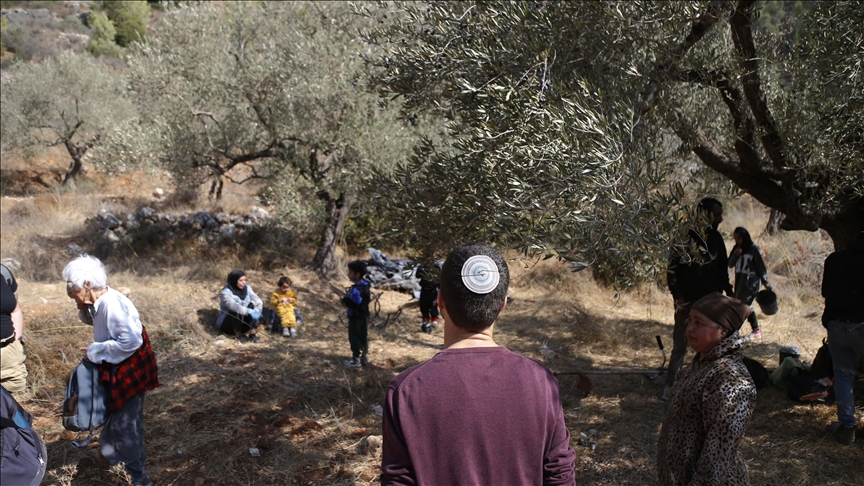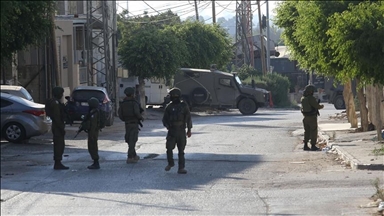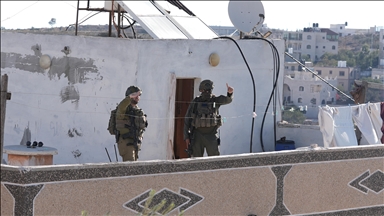Olive harvest in West Bank turns perilous as Israeli settler attacks rise
Once season of joy, olive picking has become an act of defiance for Palestinian families in West Bank town of Burqa as illegal Israeli settlements expand

RAMALLAH, Palestine / ISTANBUL
As the olive harvest begins across the occupied West Bank, the annual ritual that once symbolized unity and celebration has turned into a tense struggle for survival in the Palestinian town of Burqa, north of Nablus.
What was once marked by songs and family gatherings is now shadowed by fear. Illegal Israeli settlers, often protected by the army, roam the surrounding hills, forcing farmers to harvest under threat.
- Fields under watch
Amid the unease, 67-year-old Mohammad Abdul Rahman and his family stand among centuries-old olive trees near an illegal settlement outpost built on Burqa’s land. His son Jihad keeps watch on a nearby hill for any settler movement.
“We leave home not knowing if we’ll come back alive. We work with our lives in our hands,” Abdul Rahman told Anadolu.
Burqa is encircled by five illegal settlement outposts and an Israeli bypass road that has seized about 90% of the town’s land. Only small, hard-to-reach plots remain accessible as Israel continues expanding its settlements.
Abdul Rahman owns about 200 dunams (50 acres) but can now reach only 20. The family lost 40 dunams after they were annexed into a settlement zone.
- A weak and dangerous season
He called this year’s harvest “the weakest in production and the most dangerous due to settler attacks,” saying the family could be assaulted at any time.
The Palestinian Ministry of Agriculture said this year’s yield is among the lowest in decades, with production estimated at no more than 15% of normal levels. Palestine produced 27,300 tons of olive oil in 2024, compared with 10,000 tons in 2023.
During harvest days, one family member always stands guard. “The real pain,” Abdul Rahman said, “is watching your land being looted and destroyed before your eyes without being able to do anything.”
He said most of his trees are more than 500 years old. “The danger leaves no room for joy in our harvest.”
- Losing land and legacy
Nearby, 75-year-old Barakat Saeed stared at his devastated land where he had planted 500 olive, almond, and fig saplings three years ago — all uprooted by illegal settlers. He called the destruction “a criminal act.”
- From heritage to a bloody season
Anti-settlement activist Laith Barakat said Burqa has lost most of its land to illegal settlers who now launch near-daily attacks involving shootings, arson, and assaults on homes and vehicles.
“Olive harvest used to be a cultural ritual in Burqa. Now it’s a bloody season,” he said. “Families no longer bring women and children; they work in teams with lookouts to guard against attacks.”
He said settlers not only seize and expel Palestinians but also destroy ancient olive trees, some more than 500 years old.
Burqa once spanned 50,000 dunams (about 5,000 acres) but residents can now access less than 500 dunams, Barakat added.
The Palestinian Authority’s Colonization and Wall Resistance Commission described this year’s harvest as “the most dangerous in decades,” saying farmers face daily assaults with no protection.
According to the commission, attacks by illegal Israeli settlers and the army have uprooted, broken, or damaged 48,728 trees, including 37,237 olive trees. Settlers have carried out 7,154 attacks against Palestinians and their property across the West Bank during the two years of the war, killing 33 Palestinians and displacing 33 Bedouin communities.
Since October 2023, Israeli attacks have killed nearly 68,000 Palestinians in Gaza, most of them women and children, leaving the enclave largely uninhabitable.
Anadolu Agency website contains only a portion of the news stories offered to subscribers in the AA News Broadcasting System (HAS), and in summarized form. Please contact us for subscription options.







